 Libri di Jeremy Rifkin su Unilibro.it
)
Libri di Jeremy Rifkin su Unilibro.it
)
|
|
2024 |
 Title :
Pianeta acqua. Ripensare la nostra casa nell'universo
Title :
Pianeta acqua. Ripensare la nostra casa nell'universoAuthor: Rifkin Jeremy Publisher: Mondadori Che cosa accadrebbe se un giorno ci svegliassimo e il mondo in cui viviamo ci apparisse stranamente alieno, come se fossimo stati teletrasportati in qualche pianeta remoto? Ebbene, oggi questa spaventosa ipotesi è quantomai reale. Per effetto del riscaldamento globale assistiamo sempre più spesso a eventi meteorologici estremi - inondazioni primaverili, prolungate siccità estive, ondate di calore e incendi incontrollati, violenti uragani -, ciascuno dei quali devasta gli ecosistemi e distrugge l'infrastruttura sociale. Per troppo tempo abbiamo frainteso la natura stessa della nostra esistenza e ciò a cui dobbiamo la nostra sopravvivenza. Tutto quello che pensavamo di sapere sulla nostra casa nell'universo è sbagliato. Ci siamo convinti di vivere su una terraferma, mentre la verità è che abitiamo un pianeta d'acqua, e ora l'idrosfera, che per seimila anni abbiamo canalizzato, privatizzato, sfruttato e avvelenato, si sta ribellando e minaccia di provocare la sesta estinzione di massa sulla Terra. Con questo illuminante contributo, Jeremy Rifkin ci sollecita a ripensare il nostro posto nell'universo a partire dalla consapevolezza che viviamo su un pianeta d'acqua. In questa nuova ottica, dobbiamo riconsiderare e rimodulare ogni aspetto della nostra vita, dalla relazione con la natura ai modelli di governance sociale e ambientale, dalla concezione dell'attività economica all'educazione dei nostri figli, fino al modo in cui ci orientiamo nel tempo e nello spazio. «Ribattezzare la nostra casa 'Pianeta Acqua' non è soltanto un esercizio retorico, ma un cambiamento del senso di ori € 22,00
Scontato: € 20,90
|
 Title :
L'età della resilienza. Ripensare l'esistenza su una Terra che si rinaturalizza
Title :
L'età della resilienza. Ripensare l'esistenza su una Terra che si rinaturalizzaAuthor: Rifkin Jeremy Publisher: Mondadori Abbiamo a lungo creduto di poter costringere il mondo naturale a adattarsi alla nostra specie e ora siamo costretti a adattarci noi a un mondo naturale imprevedibile. Ma di fronte al caos che si sta dispiegando intorno a noi, ci ritroviamo senza una valida strategia. Jeremy Rifkin ci invita quindi a un radicale ripensamento della concezione del tempo e dello spazio. Perché l'Età del Progresso è ormai al tramonto, mentre una nuova e potente narrazione è in ascesa, l'Età della Resilienza: l'efficienza sta cedendo il passo all'adattività portando con sé profondi cambiamenti nell'economia e nella società. La generazione più giovane, a sua volta, si sta riorientando dalla crescita alla prosperità, dal capitale finanziario al capitale ecologico, dalla produttività alla rigeneratività, dal prodotto interno lordo agli indicatori della qualità della vita, dall'iperconsumo all'ecogestione, dalla globalizzazione alla glocalizzazione, dalla geopolitica alla politica della biosfera, dalla sovranità dello Stato-nazione alla governance bioregionale e dalla democrazia rappresentativa alle assemblee di cittadini. In un momento in cui la famiglia umana guarda con angoscia al futuro, Rifkin ci apre una finestra su inedite e promettenti prospettive e su un futuro totalmente diverso che può offrirci una seconda opportunità di prosperare sulla Terra. € 16,00
Scontato: € 15,20
|
|
2022 |
 Title :
Ecocidio. Ascesa e caduta della cultura della carne
Title :
Ecocidio. Ascesa e caduta della cultura della carneAuthor: Rifkin Jeremy Publisher: Mondadori Presentando sconcertanti dati di fatto e ricorrendo agli apporti di diverse discipline, dall'antropologia all'ecologia, Jeremy Rifkin formula una precisa e circostanziata accusa verso la 'cultura della carne' imperante in Occidente, che sarebbe responsabile da un lato di numerose malattie, dall'altro di enormi squilibri ecologici e della sottrazione di immense quantità di cereali all'alimentazione umana, incrementando così la povertà e la fame nei paesi del Terzo Mondo. € 13,00
Scontato: € 12,35
|
 Title :
L'età della resilienza. Ripensare l'esistenza su una terra che si rinaturalizza
Title :
L'età della resilienza. Ripensare l'esistenza su una terra che si rinaturalizzaAuthor: Rifkin Jeremy Publisher: Mondadori I virus prendono il sopravvento, il clima si riscalda e la Terra si sta rinaturalizzando. Abbiamo a lungo pensato di poter costringere il mondo naturale a adattarsi alla nostra specie e ora siamo costretti a adattarci noi a un mondo naturale imprevedibile. Questo mette in discussione la concezione del mondo a cui siamo da tempo affezionati. E, di fronte al caos che si sta dispiegando intorno a noi, ci ritroviamo senza una valida strategia. Il noto teorico dell'economia e della società Jeremy Rifkin ci invita quindi a un radicale ripensamento della concezione del tempo e dello spazio. Perché, come osserva in questo libro, l'Età del Progresso, un tempo considerata sacrosanta, è ormai al tramonto, mentre una nuova e potente narrazione è in ascesa: l'Età della Resilienza. Durante l'Età del Progresso la regola aurea era l'efficienza, che ci imprigionava nell'incessante sforzo di ottimizzare l'espropriazione, la mercificazione e il consumo dei doni della Terra, con l'obiettivo di accrescere l'opulenza della società umana, ma al prezzo del depauperamento della natura. Nella nuova era, invece, l'efficienza sta cedendo il passo all'adattività portando con sé profondi cambiamenti nell'economia e nella società. La generazione più giovane, a sua volta, si sta riorientando dalla crescita alla prosperità, dal capitale finanziario al capitale ecologico, dalla produttività alla rigeneratività, dal prodotto interno lordo agli indicatori della qualità della vita, dall'iperconsumo all'ecogestione, dalla globalizzazione alla glocalizzazione, dalla geopolitica alla politica della biosfera, dall € 24,00
Scontato: € 22,80
|
|
2021 |
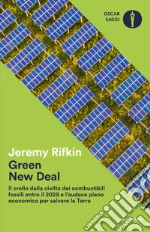 Title :
Green new deal. Il crollo della civiltà dei combustibili fossili entro il 2028 e l'audace piano economico per salvare la Terra
Title :
Green new deal. Il crollo della civiltà dei combustibili fossili entro il 2028 e l'audace piano economico per salvare la TerraAuthor: Rifkin Jeremy Publisher: Mondadori «Ancora una volta Jeremy Rifkin ha messo la sua brillante mente al servizio delle maggiori sfide dell'umanità, mostrando in termini convincenti come il modo di procedere cui siamo abituati, in campo economico, debba assolutamente mutare. 'Green New Deal' è una chiara tabella di marcia per il passaggio dell'economia statunitense a un'era post carbonio e una visione stimolante di quella che potrebbe essere l'opportunità economica più promettente della nostra vita. È una lettura obbligata per investitori, imprenditori e politici.» (Sir Richard Branson) € 13,00
Scontato: € 12,35
|
|
|
1919 |
 Title :
Green New Deal
Title :
Green New DealAuthor: Jeremy Rifkin Publisher: ST MARTIN'S PRESS € 28,50
|
|
|
2019 |
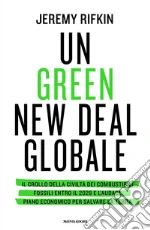 Title :
Un green new deal globale. Il crollo della civiltà dei combustibili fossili entro il 2028 e l'audace piano economico per salvare la Terra
Title :
Un green new deal globale. Il crollo della civiltà dei combustibili fossili entro il 2028 e l'audace piano economico per salvare la TerraAuthor: Rifkin Jeremy Publisher: Mondadori Una nuova visione sul futuro dell'umanità sta rapidamente guadagnando slancio. Di fronte a un'emergenza climatica planetaria, una giovane generazione sta promuovendo un dibattito sull'ipotesi di un green new deal e dettando il programma di un audace movimento politico capace di rivoluzionare la società. Sono i millennial a farsi carico del problema del cambiamento climatico. Se il green new deal è diventato un tema fondamentale nella sfera politica, nel mondo delle imprese sta emergendo un movimento parallelo che nei prossimi anni scuoterà le fondamenta dell'economia globale. Settori chiave dell'economia si stanno prontamente sganciando dai combustibili fossili a favore dell'energia solare ed eolica, più a buon mercato e accompagnate da nuove opportunità di business e occupazione. Nuovi studi stanno suonando l'allarme: migliaia di miliardi di dollari in combustibili fossili per i quali non esiste più un mercato potrebbero creare una bolla suscettibile di scoppiare entro il 2028, provocando il crollo della civiltà dei combustibili fossili. Il mercato sta parlando e i governi, se vogliono sopravvivere e prosperare, dovranno adattarsi. In questo libro Jeremy Rifkin, teorico dell'economia, espone il pensiero politico e il piano economico per il green new deal di cui abbiamo bisogno in questo momento critico. La convergenza fra la bolla dei combustibili fossili fuori mercato e una visione politica verde apre la possibilità di un passaggio a un'era ecologica post carbonio, in tempo per prevenire l'aumento della temperatura che ci farebbe superare il limite oltre il quale tornare € 22,00
Scontato: € 20,90
|
|
|
2018 |
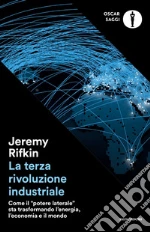 Title :
La terza rivoluzione industriale. Come il «potere laterale» sta trasformando l'energia, l'economia e il mondo
Title :
La terza rivoluzione industriale. Come il «potere laterale» sta trasformando l'energia, l'economia e il mondoAuthor: Rifkin Jeremy Publisher: Mondadori Il petrolio e gli altri combustibili fossili, le fonti energetiche su cui si basa l'odierno stile di vita nei paesi dell'Occidente, sono in via di esaurimento, e le tecnologie da essi alimentate stanno diventando obsolete. Intanto, i mali che affliggono il mondo globalizzato - crisi economica, disoccupazione, povertà, fame e guerre - sembrano aggravarsi anziché risolversi. A peggiorare le cose, si profila all'orizzonte un catastrofico cambiamento climatico provocato dalle attività industriali e commerciali ad alte emissioni di gas serra, e che già entro la fine di questo secolo potrebbe mettere a repentaglio la vita dell'uomo sul pianeta. La nostra civiltà, quindi, deve scegliere se continuare sulla strada che l'ha portata a un passo dal baratro, o provare a imboccarne coraggiosamente un'altra. E non ha molto tempo per farlo. Dopo trent'anni di studi e di attività sul campo, Jeremy Rifkin decreta la fine dell'era del carbonio e individua nella Terza rivoluzione industriale la via verso un futuro più equo e sostenibile, dove centinaia di milioni di persone in tutto il mondo produrranno energia verde a casa, negli uffici e nelle fabbriche, e la condivideranno con gli altri, proprio come adesso condividono informazioni tramite Internet. Questo nuovo regime energetico, non più centralizzato e gerarchico ma distribuito e collaborativo, e che segnerà il passaggio dalla globalizzazione alla 'continentalizzazione', dovrà poggiare su cinque pilastri... € 14,00
Scontato: € 13,30
|
|
|
2017 |
 Title :
La società a costo marginale zero. L'internet delle cose, l'ascesa del «commons» collaborativo e l'eclissi del capitalismo
Title :
La società a costo marginale zero. L'internet delle cose, l'ascesa del «commons» collaborativo e l'eclissi del capitalismoAuthor: Rifkin Jeremy Publisher: Mondadori In 'La società a costo marginale zero', Jeremy Rifkin sostiene che si sta affermando sulla scena mondiale un nuovo sistema economico. L'emergere dell'Internet delle cose sta dando vita al 'Commons collaborativo', il primo nuovo paradigma economico a prendere piede dall'avvento del capitalismo e del socialismo nel XIX secolo. Il Commons collaborativo sta trasformando il nostro modo di organizzare la vita economica, schiudendo la possibilità a una drastica riduzione delle disparità di reddito, democratizzando l'economia globale e dando vita a una società ecologicamente più sostenibile. Motore di questa rivoluzione del nostro modo di produrre e consumare è l''Internet delle cose', un'infrastruttura intelligente formata dal virtuoso intreccio di Internet delle comunicazioni, Internet dell'energia e Internet della logistica, che avrà l'effetto di spingere la produttività fino al punto in cui il costo marginale di numerosi beni e servizi sarà quasi azzerato, rendendo gli uni e gli altri praticamente gratuiti, abbondanti e non più soggetti alle forze del mercato. Il diffondersi del costo marginale zero sta generando un'economia ibrida, in parte orientata al mercato capitalistico e in parte al Commons collaborativo, con ricadute sociali notevolissime. Rifkin racconta come i prosumers, consumatori diventati produttori in proprio, generano e condividono su scala laterale e paritaria informazioni, intrattenimento, energia verde e prodotti realizzati con la stampa 3D a costi marginali... € 16,00
Scontato: € 15,20
|
|
|
1915 |
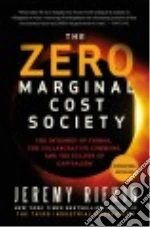 Title :
The Zero Marginal Cost Society
Title :
The Zero Marginal Cost SocietyAuthor: Rifkin Jeremy Publisher: Griffin In The Zero Marginal Cost Society, New York Times bestselling author Jeremy Rifkin describes how the emerging Internet of Things is speeding us to an era of nearly free goods and services, precipitating the meteoric rise of a global Collaborative Commons and the eclipse of capitalism. Rifkin uncovers a paradox at the heart of capitalism that has propelled it to greatness but is now taking it to its death--the inherent entrepreneurial dynamism of competitive markets that drives productivity up and marginal costs down, enabling businesses to reduce the price of their goods and services in order to win over consumers and market share. (Marginal cost is the cost of producing additional units of a good or service, if fixed costs are not counted.) While economists have always welcomed a reduction in marginal cost, they never anticipated the possibility of a technological revolution that might bring marginal costs to near zero, making goods and services priceless, nearly free, and abundant, and no longer subject to market forces. Now, a formidable new technology infrastructure--the Internet of things (IoT)--is emerging with the potential of pushing large segments of economic life to near zero marginal cost in the years ahead. Rifkin describes how the Communication Internet is converging with a nascent Energy Internet and Logistics Internet to create a new technology platform that connects everything and everyone. Billions of sensors are being attached to natural resources, production lines, the electricity grid, logistics networks, recycling flows, and implanted in homes, offices, stores, vehicles, and even human beings, feeding Big Data into an IoT global neural network. Prosumers can connect to the network and use Big Data, analytics, and algorithms to accelerate efficiency, dramatically increase productivity, and lower the marginal cost of producing and sharing a wide range of products and services to near zero, just like they now do with information goods. The plummeting of marginal costs is spawning a hybrid economy--part capitalist market and part Collaborative Commons--with far reaching implications for society, according to Rifkin. Hundreds of millions of people are already transferring parts of their economic lives to the global Collaborative Commons. Prosumers are plugging into the fledgling IoT and making and sharing their own information, entertainment, green energy, and 3D-printed products at near zero marginal cost. They are also sharing cars, homes, clothes and other items via social media sites, rentals, redistribution clubs, and cooperatives at low or near zero marginal cost. Students are enrolling in free massive open online courses (MOOCs) that operate at near zero marginal cost. Social entrepreneurs are even bypassing the banking establishment and using crowdfunding to finance startup businesses as well as creating alternative currencies in the fledgling sharing economy. In this new world, social capital is as important as financial capital, access trumps ownership, sustainability supersedes consumerism, cooperation ousts competition, and "exchange value" in the capitalist marketplace is increasingly replaced by "sharable value" on the Collaborative Commons. Rifkin concludes that capitalism will remain with us, albeit in an increasingly streamlined role, primarily as an aggregator of network services and solutions, allowing it to flourish as a powerful niche player in the coming era. We are, however, says Rifkin, entering a world beyond markets where we are learning how to live together in an increasingly interdependent global Collaborative Commons. € 21,65
|
|
|
1914 |
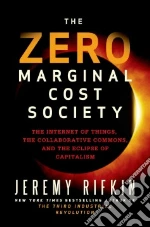 Title :
The Zero Marginal Cost Society
Title :
The Zero Marginal Cost SocietyAuthor: Rifkin Jeremy Publisher: St Martins Pr A € 26,80
|
 Title :
The Zero Marginal Cost Society (CD Audiobook)
Title :
The Zero Marginal Cost Society (CD Audiobook)Author: Rifkin Jeremy, Heath David Cochran (NRT) Publisher: Blackstone Audio Inc Argues that the Internet of Things, which is making goods and services essentially free due to a nearly zero marginal cost, is causing corporate profits to dry up, property rights to weaken, and the mindset of scarcity to give way to the possibility of abundance. € 89,30
|
 Title :
The Zero Marginal Cost Society (CD Audiobook)
Title :
The Zero Marginal Cost Society (CD Audiobook)Author: Rifkin Jeremy, Heath David Cochran (NRT) Publisher: Blackstone Audio Inc € 26,80
|
 Title :
The Zero Marginal Cost Society (CD Audiobook)
Title :
The Zero Marginal Cost Society (CD Audiobook)Author: Rifkin Jeremy, Heath David Cochran (NRT) Publisher: Blackstone Audio Inc € 32,30
|
||
|
1913 |
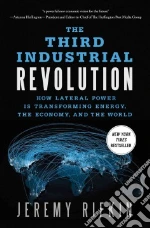 Title :
The Third Industrial Revolution
Title :
The Third Industrial RevolutionAuthor: Rifkin Jeremy Publisher: Griffin 'We are undergoing a historical transformation in the way we create and disseminate energy. Together, Internet technology and the reality of renewable energy are creating a new type of electrical grid, one in which energy is stored and distributed on an individual basis. Soon, hundreds of millions of human beings will be generating their own green energy in their homes, offices and factories, and sharing it, just as they now create their own information and share it on the Internet. In just a few years, millions of buildings and even cities will become energy self-sufficient, signaling the end of our reliance on fossil fuels. This transformation is already underway in Europe, where author Jeremy Rifkin serves as EU advisor on a project that will revolutionize the continent's energy supply, with Asia to follow. We even see shades of it in Texas, Colorado, and California, where electrical companies will be laying down parts of the Smart Grid over the next several years. But it's not just about the promise of clean energy. Rather, this 'Energy Internet' will fundamentally change every aspect of the way we work and live. It will foster continental markets and the creation of continental political unions to oversee new expansive commercial opportunities. It will signify the end of needless wars fought over energy sources, and the dawning of an era of true international cooperation. Finally, it offers the hope that we can get to a post-carbon era by mid century and avert catastrophic climate change. Here, Rifkin explains how the United States can embrace this ambitious vision of the future, end its decades-old crisis over foreign oil, and ensure its continued status as world power. He also paints an accessible, anecdotal picture of what our lives will look like in this new global order-if we can summon the political will to join it'-- € 17,00
|
|
|
1911 |
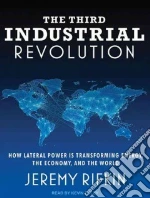 Title :
The Third Industrial Revolution
Title :
The Third Industrial RevolutionAuthor: Rifkin Jeremy, Foley Kevin (NRT) Publisher: Tantor Media Inc The industrial revolution, powered by oil and other fossil fuels, is spiraling into a dangerous endgame: the prices of energy and food are climbing, unemployment remains high, the housing market has tanked, consumer and government debt are soaring, and the recovery is slowing. Facing the prospect of a second collapse of the global economy, humanity is desperate for a sustainable economic game plan to take us into the future.Here, Jeremy Rifkin explores how Internet technology and renewable energy are merging to create a powerful ?Third Industrial Revolution.” He asks us to imagine hundreds of millions of people producing their own green energy in their homes, offices, and factories and sharing it with each other in an ?energy Internet,” just like how we create and share information online.Rifkin describes how the five pillars of the Third Industrial Revolution will create thousands of businesses and millions of jobs and usher in a fundamental reordering of human relationships-from hierarchical power to lateral power-that will impact the way we conduct commerce, govern society, educate our children, and engage in civic life.Rifkin's vision is already gaining traction in the international community. The European Parliament has issued a formal declaration calling for its implementation, and other nations in Asia, Africa, and the Americas are quickly preparing their own initiatives for transitioning into this new economic paradigm.The Third Industrial Revolution is an insider's account of the next great economic era, including a look into the personalities and players-heads of state, global CEOs, social entrepreneurs, and NGOs-who are pioneering its implementation around the world. € 37,30
|
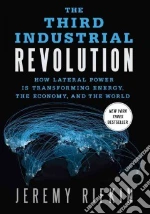 Title :
The Third Industrial Revolution
Title :
The Third Industrial RevolutionAuthor: Rifkin Jeremy Publisher: St Martins Pr 'We are undergoing a historical transformation in the way we create and disseminate energy. Together, Internet technology and the reality of renewable energy are creating a new type of electrical grid, one in which energy is stored and distributed on an individual basis. Soon, hundreds of millions of human beings will be generating their own green energy in their homes, offices and factories, and sharing it, just as they now create their own information and share it on the Internet. In just a few years, millions of buildings and even cities will become energy self-sufficient, signaling the end of our reliance on fossil fuels. This transformation is already underway in Europe, where author Jeremy Rifkin serves as EU advisor on a project that will revolutionize the continent's energy supply, with Asia to follow. We even see shades of it in Texas, Colorado, and California, where electrical companies will be laying down parts of the Smart Grid over the next several years. But it's not just about the promise of clean energy. Rather, this 'Energy Internet' will fundamentally change every aspect of the way we work and live. It will foster continental markets and the creation of continental political unions to oversee new expansive commercial opportunities. It will signify the end of needless wars fought over energy sources, and the dawning of an era of true international cooperation. Finally, it offers the hope that we can get to a post-carbon era by mid century and avert catastrophic climate change. Here, Rifkin explains how the United States can embrace this ambitious vision of the future, end its decades-old crisis over foreign oil, and ensure its continued status as world power. He also paints an accessible, anecdotal picture of what our lives will look like in this new global order-if we can summon the political will to join it'-- € 24,40
|
 Title :
A Green New Deal
Title :
A Green New DealAuthor: Ruiz-geli Enric, Rifkin Jeremy, Massip Cinta (EDT), Todo Pau (TRN), Feder Aaron (TRN) Publisher: Actarbirkhauser Depicts the addition of a plant-carrying netting to the faðcade of an arts center in Barcelona as an environmental measure, and describes how making buildings more sustainable will help to solve the world's energy and economic problems. € 23,10
|
|
2011 |
 Title :
La Civiltà dell'empatia. La corsa verso la coscienza globale nel mondo in crisi
Title :
La Civiltà dell'empatia. La corsa verso la coscienza globale nel mondo in crisiAuthor: Rifkin Jeremy Publisher: Mondadori Per secoli, filosofi, scienziati, psicologi ed economisti hanno contribuito a diffondere l'idea che l'essere umano sia per natura aggressivo e utilitarista, teso principalmente al soddisfacimento egoistico dei propri bisogni e al guadagno materiale. La storia, quindi, non sarebbe altro che una lotta senza quartiere tra individui isolati, solo occasionalmente uniti da ragioni di mera utilità e profitto. Ma negli ultimi decenni alcune sensazionali scoperte nel campo della biologia e delle neuroscienze hanno messo in dubbio questa tesi e hanno dimostrato, al contrario, che uomini e donne manifestano fin dalla più tenera età la capacità di relazionarsi con gli altri in maniera empatica, percependone i sentimenti, in particolare la sofferenza, come se fossero i propri. Alla luce di questo nuovo approccio, Jeremy Rifkin propone una radicale rilettura del corso degli eventi umani. Se nel mondo agricolo la coscienza era governata dalla fede e in quello industriale dalla ragione, con la globalizzazione e la transizione all'era dell'informazione, si fonderà sull'empatia, ovvero sulla capacità di immedesimarsi nello stato d'animo o nella situazione di un'altra persona. Tale risultato è stato però ottenuto a caro prezzo: per crescere e prosperare, società via via più complesse e sofisticate hanno richiesto sempre maggiori quantità di energia e risorse naturali, imponendo un pesante tributo all'ambiente sotto forma di un notevole aumento dell'entropia. € 11,00
|
|
|
2009 |
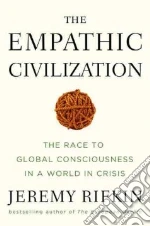 Title :
The Empathic Civilization
Title :
The Empathic CivilizationAuthor: Rifkin Jeremy Publisher: Penguin Group USA 'One of the leading big-picture thinkers of our day' (Utne Reader) delivers his boldest work in this erudite, tough-minded, and far-reaching manifesto. Never has the world seemed so completely united-in the form of communication, commerce, and culture-and so savagely torn apart-in the form of war, financial meltdown, global warming, and even the migration of diseases. No matter how much we put our minds to the task of meeting the challenges of a rapidly globalizing world, the human race seems to continually come up short, unable to muster the collective mental resources to truly 'think globally and act locally.' In his most ambitious book to date, bestselling social critic Jeremy Rifkin shows that this disconnect between our vision for the world and our ability to realize that vision lies in the current state of human consciousness. The very way our brains are structured disposes us to a way of feeling, thinking, and acting in the world that is no longer entirely relevant to the new environments we have created for ourselves. The human-made environment is rapidly morphing into a global space, yet our existing modes of consciousness are structured for earlier eras of history, which are just as quickly fading away. Humanity, Rifkin argues, finds itself on the cusp of its greatest experiment to date: refashioning human consciousness so that human beings can mutually live and flourish in the new globalizing society. In essence, this shift in consciousness is based upon reaching out to others. But to resist this change in human relations and modes of thinking, Rifkin contends, would spell ineptness and disaster in facing the new challenges around us. As the forces of globalization accelerate, deepen, and become ever more complex, the older faith-based and rational forms of consciousness are likely to become stressed, and even dangerous, as they attempt to navigate a world increasingly beyond their reach and control. Indeed, the emergence of this empathetic consciousness has implications for the future that will likely be as profound and far-reaching as when Enlightenment philosophers upended faith-based consciousness with the canon of reason. € 27,70
|
|
|
2005 |
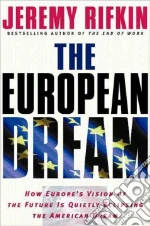 Title :
The European Dream
Title :
The European DreamAuthor: Rifkin Jeremy Publisher: Penguin Group USA The best-selling author of € 15,20
|
 Title :
Il sogno europeo. Come l'Europa ha creato una nuova visione del futuro che sta lentamente eclissando il sogno americano
Title :
Il sogno europeo. Come l'Europa ha creato una nuova visione del futuro che sta lentamente eclissando il sogno americanoAuthor: Rifkin Jeremy Publisher: Mondadori Il Sogno americano, figlio del mito della frontiera e modello di vita per molte generazioni di diversi paesi, è in netto declino. Prometteva il benessere materiale in cambio del sacrificio e della disponibilità a rischiare, mentre oggi negli Stati Uniti si lavora sempre di più ma si è pagati sempre di meno, il tempo non basta mai e le speranze in un futuro migliore sembrano dissolversi. Intanto, secondo Rifkin, in tutto il mondo si sta affermando un nuovo sogno - il Sogno europeo - che privilegia lo sviluppo sostenibile, l'integrazione sociale, la responsabilità collettiva. In questo libro Rifkin indaga nella storia culturale, scientifica e artistica del Vecchio continente per scoprire le radici di questo Sogno europeo. € 10,00
|
 Title :
La fine del lavoro
Title :
La fine del lavoroAuthor: Rifkin Jeremy Publisher: Mondadori € 10,50
|
|
2004 |
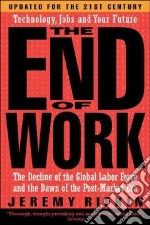 Title :
The End of Work
Title :
The End of WorkAuthor: Rifkin Jeremy Publisher: Penguin Group USA The most significant domestic issue of the 2004 elections is unemployment. The United States has lost nearly three million jobs in the last ten years, and real employment hovers around 9.1 percent. Only one political analyst foresaw the dark side of the technological revolution and understood its implications for global employment: Jeremy Rifkin. The End of Work is Jeremy Rifkin's most influential and important book. Now nearly ten years old, it has been updated for a new, post-New Economy era. Statistics and figures have been revised to take new trends into account. Rifkin offers a tough, compelling critique of the flaws in the techniques the government uses to compile employment statistics. The End of Work is the book our candidates and our country need to understand the employment challenges-and the hopes-facing us in the century ahead. € 13,10
|
|
|
2003 |
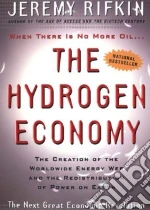 Title :
The Hydrogen Economy
Title :
The Hydrogen EconomyAuthor: Rifkin Jeremy Publisher: Penguin Group USA The road to global security,' writes Jeremy Rifkin, 'lies in lessening our dependence on Middle East oil and making sure that all people on Earth have access to the energy they need to sustain life. Weaning the world off oil and turning it toward hydrogen is a promissory note for a safer world.' Rifkin's international bestseller The Hydrogen Economy presents the clearest, most comprehensive case for moving ourselves away from the destructive and waning years of the oil era toward a new kind of energy regime. Hydrogen-one of the most abundant substances in the universe-holds the key, Rifkin argues, to a cleaner, safer, and more sustainable world. € 14,30
|
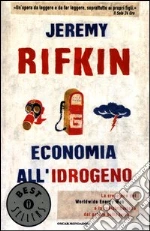 Title :
Economia all'idrogeno. La creazione del Worldwide Energy Web e la redistribuzione del potere sulla terra
Title :
Economia all'idrogeno. La creazione del Worldwide Energy Web e la redistribuzione del potere sulla terraAuthor: Rifkin Jeremy Publisher: Mondadori Alcuni dei più famosi geologi ritengono che la produzione petrolifera globale possa cominciare un rapido declino già alla fine di questo decennio. Se si considera il fatto che le riserve maggiori sono in Medio Oriente, è facile capire come l'acuirsi delle tensioni tra Islam e Occidente rischi di rendere ancor più problematico il nostro accesso a fonti di approvvigionamento petrolifero. Rifkin indica una via d'uscita a questo tragico scenario: un nuovo regime energetico fondato sull'idrogeno che rivoluzionerà le nostre attuali istituzioni politiche e di mercato. € 10,00
|
|
2002 |
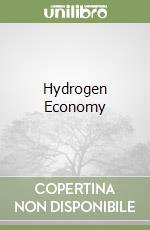 Title :
Hydrogen Economy
Title :
Hydrogen EconomyAuthor: Jeremy Rifkin Publisher: BLACKWELL PUBLISHERS € 25,50
|
 Title :
La fine del lavoro. Il declino della forza lavoro globale e l'avvento dell'era post-mercato
Title :
La fine del lavoro. Il declino della forza lavoro globale e l'avvento dell'era post-mercatoAuthor: Rifkin Jeremy Publisher: Mondadori In questo saggio Jeremy Rifkin traccia un'analisi della crisi di disoccupazione che sta investendo il mondo intero come conseguenza della rivoluzione tecnologica e informatica, che ha distrutto i vecchi 'mestieri', rendendo inutili abilità e competenze acquisite dai lavoratori delle generazioni meno giovani. Ma Rifkin non si limita a prospettare l'imminenza di una catastrofe socio-economica; ci spiega anche come sarà possibile evitare il collasso e sfruttare le potenzialità della tecnologia per creare un nuovo e più umano ordine sociale, ridefinendo il ruolo dell'individuo nella società. € 7,80
|
|
2001 |
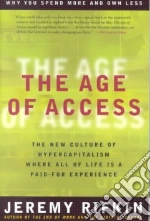 Title :
The Age of Access
Title :
The Age of AccessAuthor: Rifkin Jeremy Publisher: Penguin Group USA Visionary activist and author Jeremy Rifkin exposes the real stakes of the new economy, delivering 'the clearest summation yet of how the Internet is really changing our lives' (The Seattle Times). Imagine waking up one day to find that virtually every activity you engage in outside your immediate family has become a 'paid-for' experience. It's all part of a fundamental change taking place in the nature of business, contends Jeremy Rifkin. After several hundred years as the dominant organizing paradigm of civilization, the traditional market system is beginning to deconstruct. On the horizon looms the Age of Access, an era radically different from any we have known. € 15,70
|
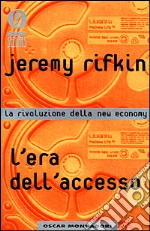 Title :
L'era dell'accesso. La rivoluzione della new economy
Title :
L'era dell'accesso. La rivoluzione della new economyAuthor: Rifkin Jeremy Publisher: Mondadori In questo libro Rifkin analizza le strutture organizzative dell'economia delle reti e i meccanismi dell'informazione caratteristici dell'era che si apre, evidenziando i rischi e le opportunità che si prospettano per lo sviluppo della società e l'emancipazione dell'uomo nel ventunesimo secolo. Da un lato il potere dei 'nuovi tiranni' del progresso, i più grandi e importanti provider internazionali, destinati a gestire l'eccesso a ogni attività e a controllare la vita di ciascuno di noi in una società dove si accresce il divario tra chi è 'connesso' e chi non lo è; dall'altro la possibilità di una maggiore diffusione della conoscenza, della democrazia e del benessere, e l'affrancamento dalla 'schiavitù' del lavoro. € 10,00
|

|

|

|